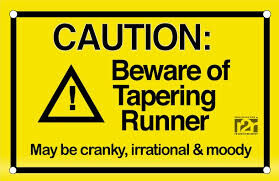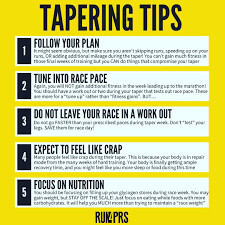Running News Daily
Running News Daily is edited by Bob Anderson. Send your news items to bob@mybestruns.com Advertising opportunities available. Train the Kenyan Way at KATA Kenya and Portugal owned and operated by Bob Anderson. Be sure to catch our movie A Long Run the movie KATA Running Camps and KATA Potato Farms - 31 now open in Kenya! https://kata.ke/
Index to Daily Posts · Sign Up For Updates · Run The World Feed
TAMING THE TAPER
How to avoid becoming unhinged during your marathon or half-marathon taper
The taper—a period of reduced training leading up to your goal race—can be a troublesome time; you might look forward to backing off the grind of training, but when you do, you might experience some guilt or anxiety about running less. Lynsey Romano, founder of Calgary-based Skyline Run Coaching, outlines a few key strategies for maximizing your downtime to get the most out of your race—and yourself—and for avoiding falling prey to the “taper tantrum.”

“The main objective of the taper is to reduce the accumulated stress on the body and mind that has built up over a training cycle,” Romano explains. “By carefully balancing a training load reduction, tapering can help an athlete optimize their muscle glycogen stores, it can enhance muscle repair, and they can just go in feeling invigorated and ready to go.”

Romano says different athletes benefit from different types of taper structures, but they all have the same objective: to reduce mileage and effort and allow your body to adjust to all your training efforts.
Don’t skimp on nutrition and hydration
You may be tempted to think that because you’re running less during your taper, you should eat less, but that’s not the case, says Romano. One of the biggest mistakes she sees in her practice is athletes tapering their nutrition along with their running volume, when the goal is to maximize glycogen stores—in other words, making sure you have plenty of energy on race day. Cutting back on nutrition can really hamper your race. Romano recommends eating a well-balanced diet that mirrors what you’d normally eat while training. And don’t forget about hydration—take in electrolytes and sip water throughout the day to make sure you’re well hydrated on race morning.
Get extra rest
The taper is also the time to take extra rest, whether it’s sleeping in or taking naps—“anything that you can do to revitalize, to rest more, is something I would support entirely,” says Romano.
She adds: “It can feel really counterintuitive to be resting when you’re getting ready to do something that is a considerable physical feat.” This is one reason potentially unnerved athletes should pay close attention to how they’re feeling during this time. Sometimes a nap is a better idea than a short run, if you’re feeling tired.
It’s also completely normal to have some aches and pains as your body absorbs your training, and taper week is the perfect opportunity to book a pre-race massage, physio or chiropractic appointment to work out any lingering kinks.
Nurture your mindset
As for the mental side of things, the taper allows you the time to get your mental game in check. Romano recommends creating mantras you can repeat to yourself during the race, or writing a motivational phrase on your arm for visual encouragement. Creating a race plan will also help prepare you mentally, and can help quell some of those race-day nerves. (But remember to be flexible, adjusting your plan on the fly if you encounter difficult weather conditions, or you find yourself nurturing a minor injury on race day.)
You want to go into your race feeling fresh mentally and physically and ready to leave it all out on the course. Above all, don’t forget to have fun!
Login to leave a comment




